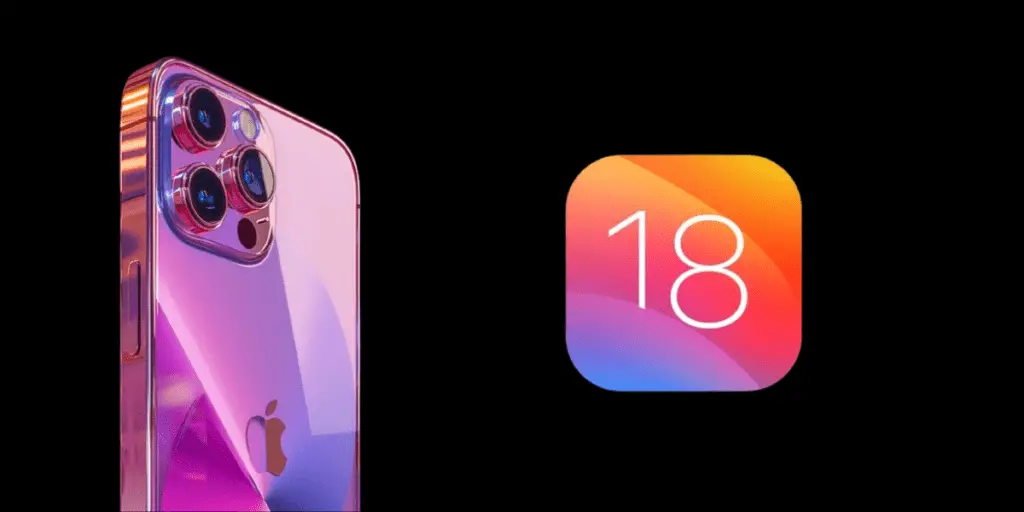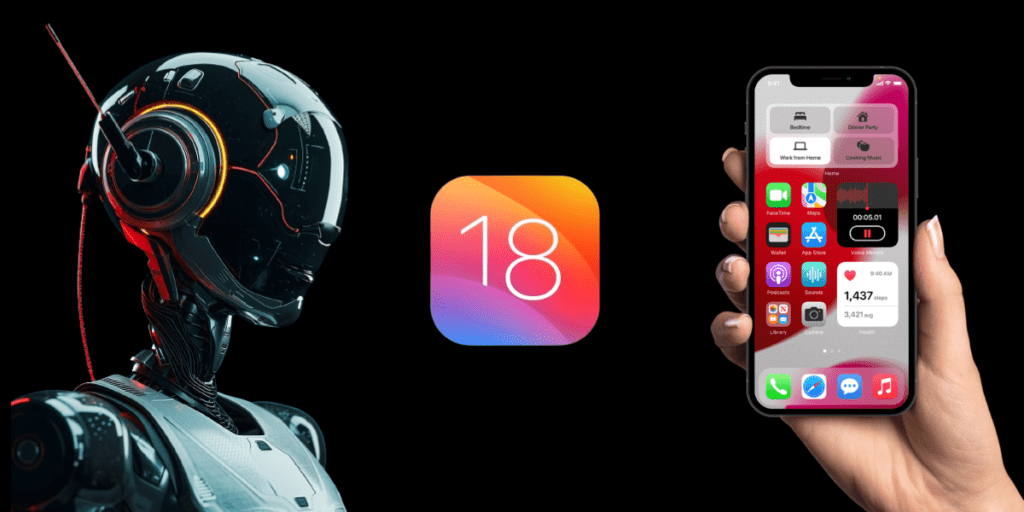Artificial intelligence has emerged as a critical battleground for tech giants. In recent years, companies like Google and Samsung have pushed the envelope with their Pixel 8 and Galaxy S24 series, showcasing AI-driven features designed to enrich user experiences.
Amidst this backdrop of rapid innovation, all eyes are now turning towards Apple, a company known for its meticulous approach to integrating new technologies into its ecosystem. With the unveiling of iOS 18 on the horizon, there’s mounting speculation and anticipation that Apple is poised to make a significant leap forward in AI.
The evolution of Siri in iOS 17 marked a modest step towards this direction, introducing enhancements that hinted at Apple’s growing interest in AI. However, Siri’s advancements were just the tip of the iceberg compared to the generative AI capabilities of Google’s Bard or Open Ai’s ChatGPT.
The tech community is abuzz with rumors and predictions about iOS 18, fueled by reports and newsletters suggesting that the upcoming software update could be the most substantial in the iPhone’s history.
This introduction to iOS 18 aims to explore the potential AI-driven features and enhancements that could redefine how users interact with their iPhones, setting a new standard for what’s possible in mobile technology. As we delve into the possibilities that iOS 18 might hold, it’s clear that Apple is not just catching up in the AI race but is possibly gearing up to redefine it.
IOS 18 Background and Context
Siri, Apple’s voice-activated assistant, has been a staple feature since iOS 5, released in 2011. Over the years, Siri has undergone numerous updates, enhancing its functionality and user interface. However, the evolution of Siri has often been viewed through the lens of incremental improvement rather than revolutionary change.
With iOS 17, Apple introduced AI-powered features, including voice cloning and an improved keyboard autocorrect, showcasing a renewed focus on leveraging artificial intelligence to enrich the user experience. Yet, compared to the strides made by competitors in AI, Siri’s advancements have often appeared modest.
The smartphone industry’s trajectory highlights a significant pivot towards AI-driven features, with Google and Samsung at the forefront of this shift. Google’s Pixel 8 lineup debuted with AI-enhanced capabilities, aiming to simplify and automate user interactions.
Samsung introduced its Galaxy S24 series, embedding Galaxy AI into the fabric of its devices, offering users a suite of intelligent features designed to anticipate and respond to their needs. These developments underscore a broader industry trend toward integrating generative AI technologies that can offer more personalized and intuitive user experiences.
Amidst this backdrop, Apple’s approach to AI in its iPhones has been more reserved, focusing on specific areas such as photoduplication detection and image enhancement.
This strategy has positioned Apple as playing catch-up in the public’s eye, especially in generative AI, where competitors have made significant inroads.
The anticipation surrounding iOS 18 suggests that Apple is preparing to leap forward, potentially bringing groundbreaking updates that could alter the landscape of AI integration in smartphones.
The industry’s move towards more sophisticated AI features sets the stage for Apple’s response with iOS 18. With competitors showcasing the potential of AI to revolutionize user interactions, the pressure is on Apple to deliver a software update that matches and exceeds these innovations.
As rumors and reports hint at a “relatively groundbreaking” update, the tech community eagerly awaits Apple’s next move. Will iOS 18 mark a pivotal moment in the evolution of Siri and the iPhone’s AI capabilities? Only time will tell, but the groundwork laid by iOS 17 and the competitive landscape suggests that significant changes are on the horizon.

The Next Big Leap
As anticipation builds for iOS 18, the tech world is abuzz with predictions and rumors about what could be Apple’s most significant software update yet. According to industry insiders and the well-regarded Mark Gurman’s Power On newsletter, iOS 18 is poised to introduce “relatively groundbreaking” updates that could redefine the iPhone experience.
This major overhaul is expected to encompass many new features and designs, potentially marking the most significant leap in iPhone software history. Central to this excitement is the anticipated integration of advanced AI capabilities, signaling a significant shift in how users interact with their devices.
Speculation suggests that Siri, Apple’s voice-activated assistant, will receive a substantial upgrade, leveraging large language models to perform more complex tasks, such as converting a series of photos into a GIF and sending it to a contact with simple voice commands.
RCS support aims to bridge the communication gap between iPhone and Android users, offering features like end-to-end encryption and high-quality media sharing, previously exclusive to iMessage.
This comprehensive upgrade, rumored to be unveiled at Apple’s WWDC, promises to enhance existing functionalities and introduce new ways of engaging with our smartphones.
If these rumors hold true, iOS 18 represents a significant milestone in the evolution of mobile software, demonstrating Apple’s commitment to pushing the boundaries of what’s possible with AI and smartphone technology.
Potential Impact and Benefits
The rumored advancements in iOS 18, particularly its AI-driven features, stand to revolutionize the user experience in several compelling ways. By potentially making Siri smarter through the integration of generative AI technologies, users could experience a more intuitive and responsive assistant capable of efficiently handling complex requests.
This leap forward in AI could transform everyday tasks, from organizing photos and sending messages to providing real-time information and assistance, making the iPhone an even more indispensable tool for personal and professional use.
Introducing RCS support could significantly enhance communication between iPhone and Android users, offering a more unified messaging experience that includes high-quality media sharing, read receipts, and end-to-end encryption, addressing a long-standing fragmentation in mobile communication.
These enhancements promise to elevate the convenience and efficiency of using an iPhone and set new standards for privacy, security, and interoperability in the smartphone industry. The potential impact of iOS 18 extends beyond individual user benefits, shifting the competitive landscape by setting a high bar for AI integration in mobile devices and encouraging innovation and improvements across the board.
Challenges and Considerations
While promising, the ambitious leap into advanced AI integration with iOS 18 presents Apple with a series of challenges and considerations that must be carefully navigated to ensure success. One of the most significant hurdles is balancing the innovative push toward AI with the imperative of safeguarding user privacy and data security.
Apple, known for its strong stance on privacy, faces the task of implementing generative AI features in a way that does not compromise the confidentiality and integrity of user data. This is particularly crucial as AI systems typically require access to vast amounts of data to learn and make decisions, raising concerns about how this data is collected, used, and protected.
Another critical consideration is ensuring that the new features and enhancements are accessible to a wide range of users, including those with older iPhone models. Historically, each new iOS version drops support for some older devices.
With the expected processing demands of advanced AI features, there is speculation that iOS 18 may require more recent hardware. This raises questions about device compatibility and whether users of older models will miss out on the latest innovations, potentially widening the gap between the newest and older devices.
Moreover, the integration of RCS messaging aims to improve interoperability between iOS and Android devices, but implementing it to complement the existing ecosystem without diluting the unique advantages of iMessage poses a challenge.
Apple must navigate the delicate balance between opening up new communication pathways and maintaining the exclusive features that have helped differentiate the iPhone.
Finally, introducing cutting-edge AI capabilities into Siri and other aspects of iOS 18 comes with the challenge of ensuring these features are not only technologically impressive but also genuinely helpful and user-friendly. There’s a risk of over-complicating the user interface or introducing features that, while advanced, may not meet practical user needs or preferences.
As Apple prepares to unveil iOS 18, the company must carefully consider these challenges, ensuring that the advancements in AI not only showcase technical prowess but also enhance the user experience in meaningful ways.
All while maintaining the commitment to privacy and security that users expect from Apple. Successfully addressing these considerations could solidify Apple’s position as a leader in the next wave of smartphone innovation.
Looking Ahead
Looking ahead to the release of iOS 18 and beyond, it’s clear that Apple is on the cusp of ushering in a new era for its operating system, centered around integrating advanced artificial intelligence. This move is not just about enhancing the capabilities of Siri or introducing novel features; it’s about fundamentally redefining the user experience and setting a new benchmark for mobile technology. As AI continues to evolve, its potential to personalize and streamline interactions with our devices is boundless.
From more predictive and adaptive user interfaces to more innovative, context-aware applications, the future of iOS promises a shift towards a more intuitive and seamless technology integration into our daily lives.
The implications of iOS 18’s rumored features extend beyond individual user benefits, signaling a broader impact on the smartphone industry and technology. By pushing the envelope on AI, Apple challenges its competitors to elevate their offerings and contributes to accelerating innovation across the board.
This could lead to a more dynamic and competitive market, where the focus shifts towards creating more intelligent, user-centric technologies.
In addition to technological advancements, Apple’s emphasis on privacy and security in the context of AI introduces a critical dialogue within the tech industry about ethical AI use.
As AI increasingly integrates into our devices, the conversations around data privacy, consent, and security become more pertinent. Apple’s approach to navigating these issues could set precedents for how AI is implemented responsibly in consumer technology.
The potential expansion of AI capabilities within iOS opens up new possibilities for developers and creators. With more powerful tools at their disposal, we could see a surge in innovative apps and services that leverage AI in novel ways, further enriching the ecosystem and offering users new experiences that were previously unimaginable.
As we look forward to the unveiling of iOS 18 and its subsequent iterations, the excitement lies in the features themselves and the broader vision they represent. Apple’s foray into more advanced AI integration signifies a commitment to pushing the boundaries of what’s possible, ensuring that the iPhone remains an essential, ever-evolving companion in our increasingly digital world.
The journey ahead for iOS and Apple’s ecosystem is poised to be as transformative as it is exciting, marking a new chapter in the convergence of technology, intelligence, and human-centric design.

Final Thoughts
The anticipation surrounding iOS 18 and its potential integration of advanced artificial intelligence underscores a pivotal moment for Apple and the broader smartphone industry. As we stand on the brink of what could be the most significant update in iPhone history, the implications of this leap into AI are far-reaching.
This move reflects Apple’s commitment to innovation and signals a shift towards creating more intuitive, personalized user experiences through technology. The rumored enhancements, from a smarter Siri to improved interoperability with Android devices via RCS support, suggest a future where our devices understand and anticipate our needs more seamlessly than ever before.
The journey towards this future has its challenges. Balancing the drive for innovation with the imperative of user privacy, ensuring accessibility and compatibility across devices, and genuinely enhancing user experience through practical, user-friendly AI integrations are critical considerations that Apple must navigate. The success of iOS 18 will largely depend on how well these challenges are addressed.
Looking beyond the immediate release, the evolution of iOS promises to catalyze further innovation across the tech landscape, challenging competitors and inspiring developers to explore new possibilities in AI.
As Apple continues to push the boundaries of what’s possible with smartphone technology, the impact of iOS 18 could redefine our relationship with technology, setting new standards for privacy, security, and user experience in the digital age.


